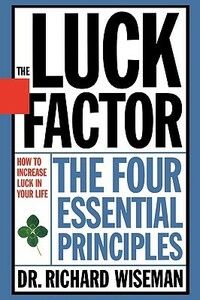Take a photo of a barcode or cover
29 reviews for:
The Luck Factor: Changing Your Luck, Changing Your Life - The FourEssential Principles
Richard Wiseman
29 reviews for:
The Luck Factor: Changing Your Luck, Changing Your Life - The FourEssential Principles
Richard Wiseman
I have a better title for this book: Keep Your Eyes Open, Listen to Your Gut, And Think Positive!
I read the first 67 pages with the best intentions of doing the exercises etc., but I felt like it was the same info presented over and over. So I skimmed the next 30 pages, then flipped through the rest of the book, and called it a day. The main thing I got from this book is various scientific proof that I am indeed lucky. Yay!
I read the first 67 pages with the best intentions of doing the exercises etc., but I felt like it was the same info presented over and over. So I skimmed the next 30 pages, then flipped through the rest of the book, and called it a day. The main thing I got from this book is various scientific proof that I am indeed lucky. Yay!
This book can be summarised to think you are lucky and you will be. The science provided in this book is mainly people self-reporting. As many have stated the subject of luck isn't clearly defined and people view luck in different ways. The general format is a good chunk of people who think they are lucky do x this means that by doing that you will also be lucky. X is a various of different things such as talk to more people, go out more etc If you are an introvert the advice in this book goes against everything you do. What this book fails to comment on, is things outwith our control such as our upbringing, schooling, childhood experiences. I found this book to be harmless and helping people to have a positive outlook on things. But it is pseudo-science and has way too many anecdotes from people rather than details of his "study"
slow-paced
Excepcional por su brevedad y su aplicabilidad, Wiseman explica uno de los mayores experimentos que se han hecho sobre la suerte y su impacto, si no el mayor hasta la fecha. La conclusión es que las personas afortunadas se comportan de un modo distinto que las desdichadas, y que la suerte como fuerza misteriosa no existe. Me gustan los libros que me dan la razón, de modo que me encanta este libro, y además es destacable que en cada paso da ejercicios y prácticas concretas que se pueden llevar a cabo para mejorar tu suerte. Y valen mucho la pena.
No le doy cinco estrellas porque el exceso de anécdota personal le hace parecer autoayuda a veces, y lo alarga un poco más de lo necesario. Por lo demás, fantástico.
No le doy cinco estrellas porque el exceso de anécdota personal le hace parecer autoayuda a veces, y lo alarga un poco más de lo necesario. Por lo demás, fantástico.
I probably read this book with the wrong expectation. I learned of its existence through an article I read in a journal. The article, in contrast to the book, was fairly interesting (which was why I decided to read the book). Huge fucking mistake. But since it was an easy read, I consider myself lucky (haha, 4th principle), that I only wasted four hours of my life.
Seriously, which writer can claim that he is writing a scientific book and at the same time offer a self-guide to being more lucky? I don’t doubt the man’s ability (he is, after all, a professor) but at least he could be honest about what the book really is: popular pseudo-scientific "literature".
But there was another thing that bothered me while reading the book. Although I agree with the fact that luck may be for a big part dependent on the way individuals handle opportunities, I think this is not the only factor.
The people you meet, the chances you get and the possibility to use them in an effective way is for a large part determined by structural things which are far more difficult to change. Your social background, where you go to school, your friends, your health etc… are all things that are difficult to control, but so important in explaining the chances someone get. These things are not mentioned (not even in the reference list!) in the book.
I get that it has to be positive to attract readers, but by not being more nuanced the author undermines (again) his claim that this is a scientific book.
Seriously, which writer can claim that he is writing a scientific book and at the same time offer a self-guide to being more lucky? I don’t doubt the man’s ability (he is, after all, a professor) but at least he could be honest about what the book really is: popular pseudo-scientific "literature".
But there was another thing that bothered me while reading the book. Although I agree with the fact that luck may be for a big part dependent on the way individuals handle opportunities, I think this is not the only factor.
The people you meet, the chances you get and the possibility to use them in an effective way is for a large part determined by structural things which are far more difficult to change. Your social background, where you go to school, your friends, your health etc… are all things that are difficult to control, but so important in explaining the chances someone get. These things are not mentioned (not even in the reference list!) in the book.
I get that it has to be positive to attract readers, but by not being more nuanced the author undermines (again) his claim that this is a scientific book.
hopeful
informative
inspiring
lighthearted
medium-paced
hopeful
informative
inspiring
reflective
medium-paced
An interesting book of scientific case studies by Richard Wiseman, highlighting the power of our intention based on our belief system. A great read for those who want to create positive change in their lives.
I know there's some junk pop psychology science out there, and I'm not qualified to comment on the validity of his studies in the book. This ideas will look like common sense to most people, but I appreciated that he took a scientific approach to investigate how "lucky" and "unlucky" people behave and view the world. In short, attitude is everything.
I already understand how deeply attitude, and having untreated anxiety and depression, can color how you view the world and therefore how you behave in life, and reading this really brought that home for me. If you know any woe-is-me types, or are one yourself, or were raised by one (or more), you'll get a lot out of this book.
The author doesn't address untreated anxiety or depression, and I think he could have done so effectively. It can look like he's just suggesting a few attitude adjustments will solve everything, which obviously isn't true. I chose to read it as if anyone wishing to change their luck is operating at a relatively stable baseline in terms of mental health, and if not, seeking treatment would come first or go nicely hand in hand with reading this book.
I already understand how deeply attitude, and having untreated anxiety and depression, can color how you view the world and therefore how you behave in life, and reading this really brought that home for me. If you know any woe-is-me types, or are one yourself, or were raised by one (or more), you'll get a lot out of this book.
The author doesn't address untreated anxiety or depression, and I think he could have done so effectively. It can look like he's just suggesting a few attitude adjustments will solve everything, which obviously isn't true. I chose to read it as if anyone wishing to change their luck is operating at a relatively stable baseline in terms of mental health, and if not, seeking treatment would come first or go nicely hand in hand with reading this book.





